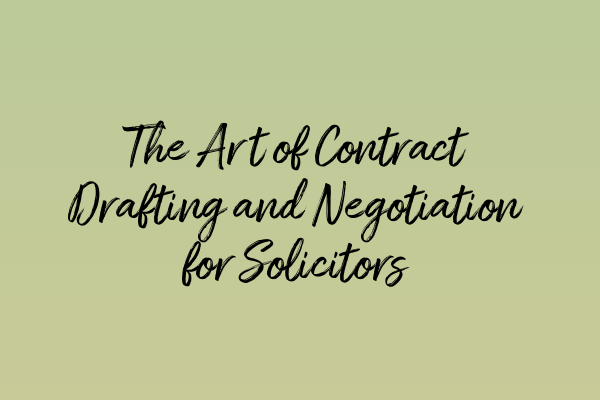The Art of Contract Drafting and Negotiation for Solicitors
When it comes to the practice of law, one area that requires exceptional skill and attention to detail is contract drafting and negotiation. As a solicitor, your ability to draft clear and concise contracts that effectively protect your clients’ interests is crucial. In this article, we will explore the art of contract drafting and negotiation and provide you with valuable insights on how to navigate this complex process.
Before we delve into the details, it is important to understand the fundamental purpose of contract drafting and negotiation. Contracts serve as legally binding agreements between parties, outlining the rights, obligations, and responsibilities of each party involved. The drafting process involves carefully crafting the language and terms of the contract to ensure clarity, enforceability, and fairness.
To begin, let’s discuss the essential elements of contract drafting. One of the key aspects is clarity – contracts should be written in plain language, avoiding unnecessary legal jargon that may confuse parties. Using simple and concise language helps ensure that all parties involved understand their obligations and can comply with them effectively. Additionally, your contract should be organized logically, with headings and numbered clauses, making it easier to navigate and comprehend.
Another crucial consideration in contract drafting is precision. Each provision and clause must be carefully drafted to accurately reflect the intentions of the parties involved. Pay close attention to defining terms and using appropriate language to avoid ambiguity or misinterpretation. This precision extends to punctuation, grammar, and syntactical structure, ensuring that your contract is free from errors that could lead to unintended consequences.
While drafting the contract, it is vital to anticipate potential issues and address them proactively. Including provisions that address potential disputes, termination, and remedies can help mitigate issues that may arise in the future. As a solicitor, your expertise in identifying these potential pitfalls and providing appropriate solutions can significantly enhance the contract’s effectiveness.
Negotiation is another integral part of the contract drafting process. Effective negotiation skills can help you achieve favorable terms for your clients. Prioritize active listening and understanding the needs and objectives of all parties involved. By empathetically considering the interests of each party, you can explore mutually beneficial solutions that may improve the overall outcome and reduce the likelihood of future disputes.
During negotiations, be prepared to make concessions while remaining steadfast in protecting your clients’ interests. Negotiation requires finding common ground while advocating for your clients’ positions. By employing effective communication skills and persuasive arguments, you can navigate complex negotiations to arrive at an agreement that meets your clients’ goals.
In the modern digital age, leveraging technology can streamline the contract drafting and negotiation process. A wide array of software options are available to assist solicitors in drafting contracts efficiently and securely. These tools can aid in organizing clauses, managing versions, and automating certain aspects of the drafting process. Embracing technology can save time, reduce errors, and ultimately enhance your productivity as a solicitor.
In conclusion, the art of contract drafting and negotiation requires a combination of legal expertise, strong communication skills, and attention to detail. By focusing on clarity, precision, and anticipation of potential issues, you can craft contracts that effectively protect your clients’ interests. Additionally, honing your negotiation skills and embracing technological advancements can further elevate your abilities as a solicitor in this critical field.
For further reading on related topics, we recommend the following articles:
– Private Prosecutions: Exploring Non-Governmental Prosecutions in Criminal Cases
– Ethical Challenges in Criminal Defence: Navigating Dilemmas
– Understanding Drug-related Offences: Laws and Penalties in the UK
– Magistrates’ Court vs Crown Court: Different Paths in Criminal Proceedings
– Criminal Defence Strategies: Expert Approaches to Protecting Clients’ Interests
We hope this article has provided valuable insights and practical guidance for solicitors seeking to enhance their skills in contract drafting and negotiation. By mastering this art, you can better serve your clients and contribute to the overall success of your legal practice.


Leave a Reply